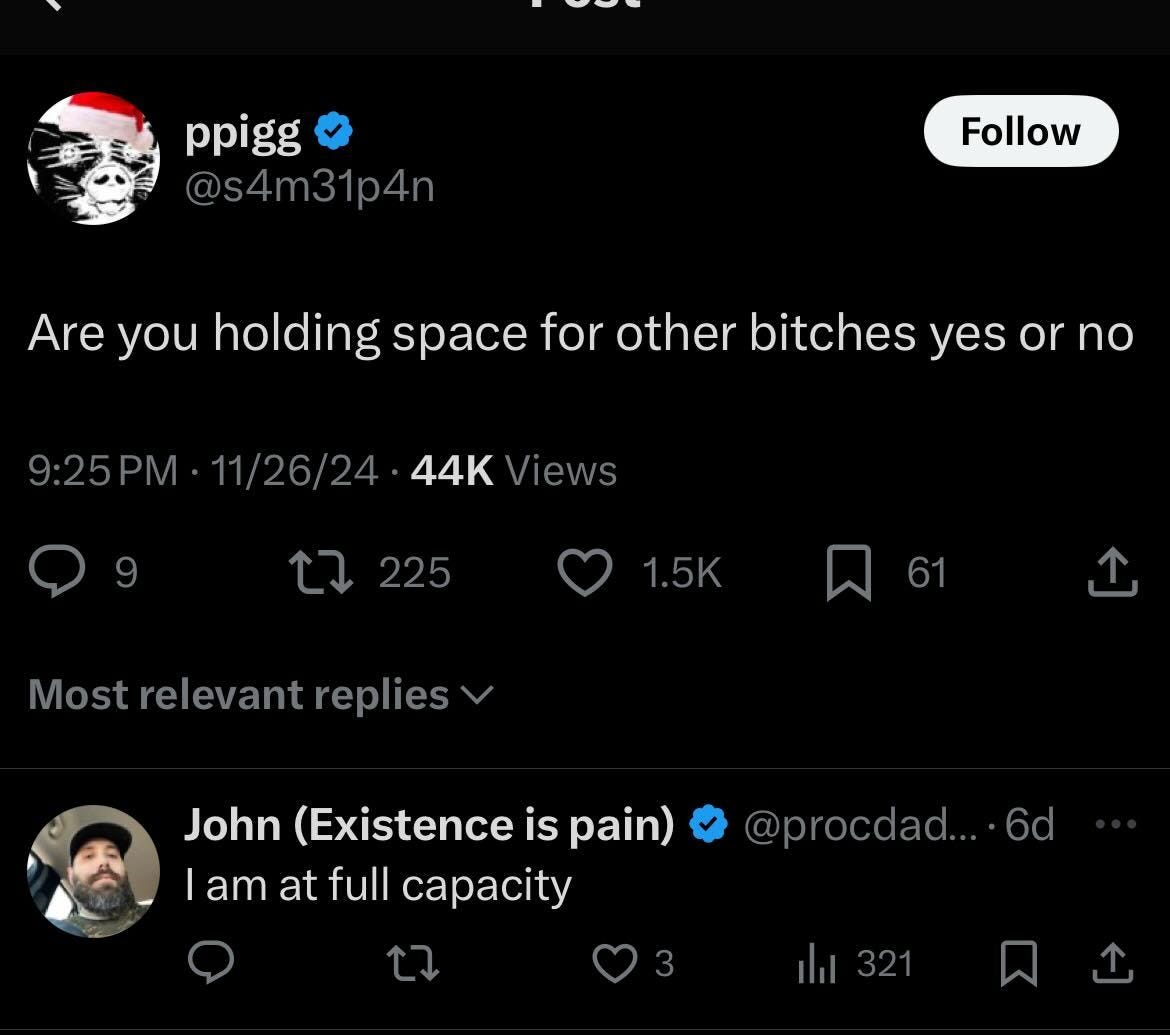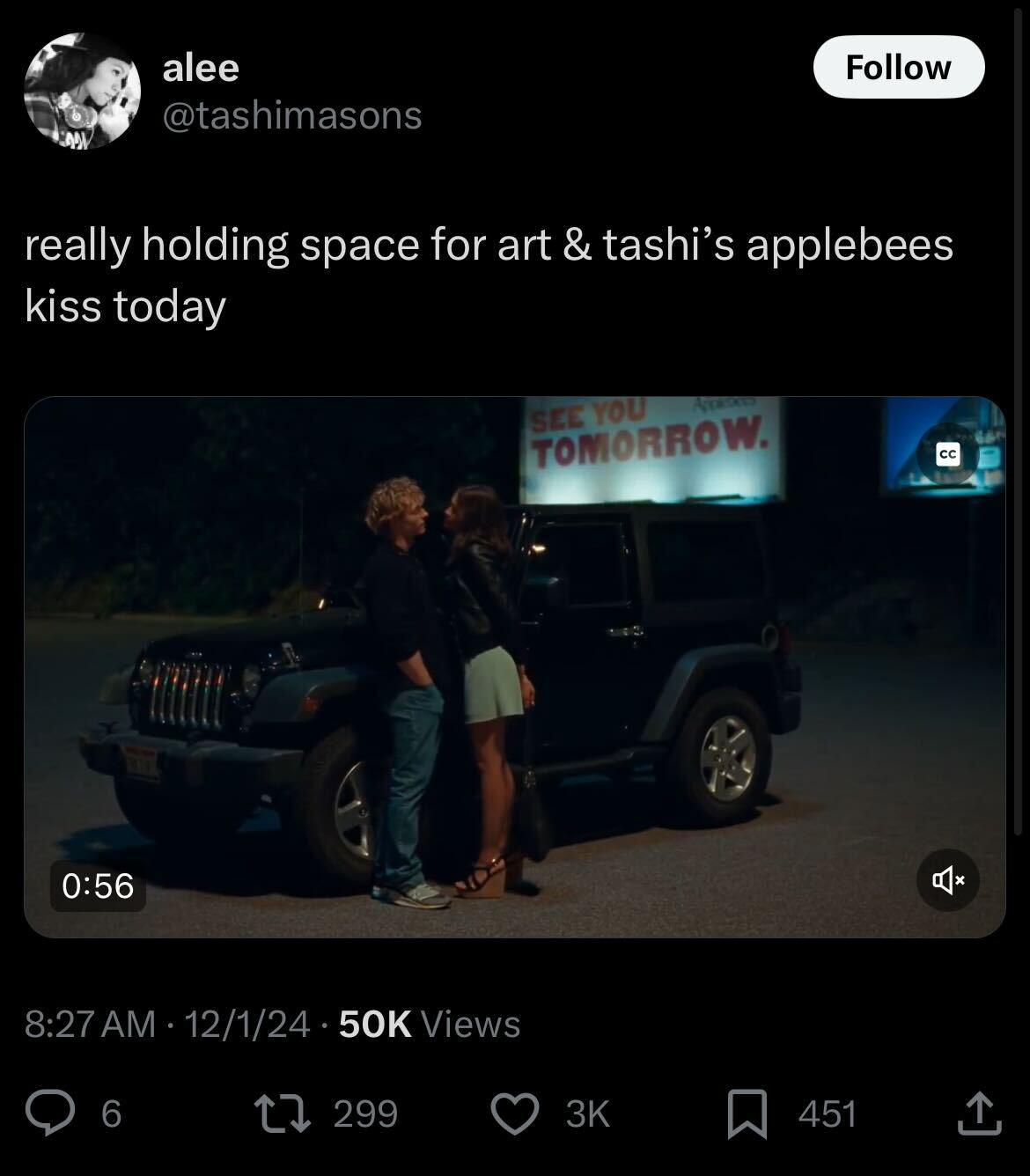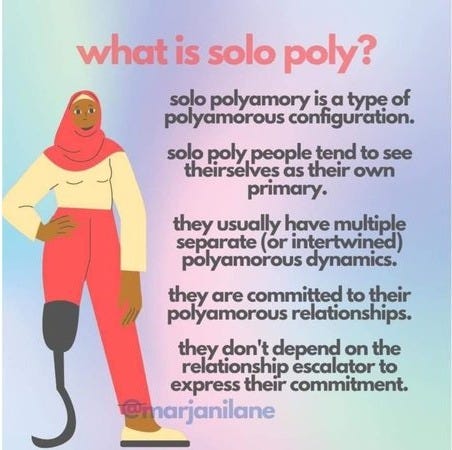The Deflection of Therapy-Speak and the Erosion of Authenticity
On therapy-speak (or "HR-speak," as I call it based on my experiences in a nonprofit HR department) in American leftist spaces—and how the latest memes indicate a much needed cultural shift.
It’s 2021. I’ve been called into my HR department for the third time. At the time, I worked at a homeless shelter as one of the only Spanish-speaking case managers, with many of my undocumented clients having gone over a decade without proper services. For context: my parents experienced firsthand the dysfunction of the U.S. immigration system and had to jump through countless hoops to meet their basic needs. Growing up, I lived with the constant fear of their deportation, which surfaced in strange ways—like crying uncontrollably during Spirited Away when her parents were turned into pigs, or thinking they were never coming back if they took longer than expected at the grocery store.
The realities of the undocumented experience shaped my world firsthand. People I loved were worn down by a system designed to exclude yet exploit them. Meanwhile, my hometown (a mostly red-voter city) echoed familiar contradictions: “They’re taking all our jobs!” paired with “They’re lazy bums mooching off of public benefits!” (I’d like to think my sense of humor was largely shaped by noticing incongruities such as this). I would of course explain that undocumented immigrants often work grueling, low-wage jobs no one else wants, and can’t even access public benefits without a Social Security number. My parents told me to lay low when these conversations came up, but I couldn’t help myself. I quickly realized many Americans did not understand basic information about the country they grew up in.
Flash forward to my job at the shelter. The organization prided itself on its Housing First ethos, which essentially means prioritizing permanent housing for all without barriers like sobriety or treatment. Its commitment to mandatory monthly diversity, equity, and inclusion meetings was absurdly juxtaposed by their refusal to pay bilingual case managers more than monolingual ones. My role involved helping over 300 clients navigate SNAP, Medicaid, and Social Security Disability Income applications. I also managed a caseload of undocumented Spanish-speaking clients, for whom these services were legally inaccessible.
In weekly staff meetings, a WASP-y LCSW from a wealthy background would confidently suggest solutions for my undocumented clients without grasping the legal barriers they faced. When I explained (again) that Medicaid requires a Social Security or ITIN number, she would take offense, claiming I had a “negative attitude.” Her complaints landed me in HR meetings, where a plethora of buzzwords were unleashed:
We want to hold space for your lived experiences as a Latinx woman, but we’ve received complaints from some people who think you could be doing more for folks on your caseload. We want you to feel like you can be your true self—without, you know, making other people feel... uncomfortable with your experiences. We really value that you bring a rich cultural perspective, which we think adds so much to the company! But if you could be more mindful of your communication style, we think it would make [the LCSW] feel a lot more welcomed in to the conversation. We invite you to call people in instead of calling them out.
I would respond:
I did not raise my voice, and it wasn’t my intention to be disrespectful. I was just trying to remind her that there are things we simply can’t do for my undocumented clients, not because I’m lazy, but because there are literal legal barriers she doesn’t seem to know about. It could get [my clients] into some serious trouble.
Needless to say, my faith in social work jargon1 was obliterated. These words—which claimed to prioritize care—ignored the structural realities of those it purported to be advocating for.
I thought I freed myself from this doublespeak culture when I decided to finally leave social work, but a few years later, I started seeing this language everywhere. People who had never worked in social services began using terms like “holding space” and “emotional labor” in everyday conversations. The concept of “friendship” was transformed into a cold business transaction, with tweets like this being liked and shared unironically and with praise:
One ex-friend stopped texting me after October 7th, and when I asked why, she replied with an eerily calculated message:
“I want to hold space for your lived experiences as a Jewish woman, but I think it’s important to center the trauma of Palestinian folks. Your fears are valid, but I want to be mindful not to take away from their systemically traumatizing experience, which has been everpresent since 1948.”
To which I replied:
Dude, this was the largest pogrom against my community, in what way is this taking anything away from anyone else? Would you say this to any other minority?
I cried when I realized her response mirrored the hollow language of my former workplace’s HR department. It prioritized signaling care over genuine connection, and transformed our once-loving-friendship into implicit assumptions of bad-faith. The conversation ended how you’d imagine it would.
So why did this happen? My theory is that this communication style is used as a tool to signal care while upholding individualism and skirting accountability in interpersonal relationships. Being emotionally unavailable for the people you love can be hidden under “protecting your peace”. Being a “low-maintenance friend” is the new cool girl signifier. People in need of extensive emotional support are vilified under the term “emotional vampires”. The list goes on.
Even sociological frameworks/processes and therapy terms have been stripped of their intended meaning by the American leftist zeitgeist. Below you’ll find a few examples:
The term "emotional labor," originally coined by Arlie Hochschild to describe the effort of managing one's emotions to fulfill the demands of a job role, has since been removed from its original context and applied to intimate interpersonal relationships.
The term “gaslighting” originated from the 1938 play titled “Gas Light”, where a husband tries to convince his wife that she is crazy by making her believe that the gaslights in their house are dimming. In mental health fields, it is used to describe a dark dynamic, where “someone manipulates you into questioning your sanity, your experience, your memory, even your reality…[in the context of] abusive relationships”(Time Magazine, 2023). It has since been stripped of its intended meaning and used to describe anything from someone telling a lie to someone expressing a different opinion.
The term "intersectionality," coined in 1989 by American civil rights advocate and critical race theorist Kimberlé Williams Crenshaw, was initially intended to describe the double discrimination faced by Black women and examine how overlapping systems of oppression create distinct experiences for individuals with multiple marginalized identities. Over time, however, it became co-opted by American leftists as a marker of moral virtue. During the 2010s and 2020s, as the public grew more receptive to stories from marginalized communities, intersectionality became a celebrated framework in media, from films to books to music. We saw a gradual shift from being a lens for understanding systemic inequality to a tool for accruing social and fiscal currency, ultimately reducing an important concept into an often-absurd token of performative Goodness.
Just like HR departments, the popularization of this jargon has become a tool to signal concern and care while upholding the American status quo of individualism.
But something shifted this past month. It’s the second to last month of 2024, and people are now parodying the same language they once used unironically in 2020. Memes mocking phrases like “holding space” and performative inclusivity gained traction. Could it be a sign of a cultural shift? Or perhaps a new divide emerging among leftists? Either way, exaggerated emotional seriousness and transactional-disguised-as-therapeutic jargon have finally become socially acceptable targets of criticism.
This brings me to the first example—the “holding space” Wicked press tour interview (2024). You can watch it below if you haven’t yet:
The interviewer’s exaggeration of the number of people “holding space for the lyrics of Defying Gravity” became viral fodder, with “holding space” at the core of each joke.
The second example: Solo Poly Black Hijabi Amputee, 2020
And for those of you who aren’t chronically online, here are a couple of examples of its meme-ification in 2024:
Originally an earnest attempt to explain the concept of “solo polyamory” in 2020, the image’s meaning has developed a life of its own almost 4 years later. Initially, the Solo Poly Black Hijabi Amputee was used as an accessory to the creator’s content of polyamory, and was largely viewed as a marker of the creator’s moral virtue. In 2024, however, it now showcases a superficial simulation of intersectionality, resulting in a diluted mismatched amalgamation of identity signifiers that ultimately reduce its relatability to the very people it aims to represent. In other words, the joke is that we see the absurdity for what it truly is.
My readers, I truly believe a change has come. We have shifted so far from where we were 5 years ago that the same language once weaponized for social clout is now able to be a punchline. People who once would’ve been canceled for laughing at such things are now going viral,⤵
and people who would’ve once gone viral in 2020 are now seen as genuinely absurd2. ⤵
So where do we go from here? The co-opting of social work jargon has exposed its limitations. While terms like “emotional labor” can describe genuine experiences outside of the workforce context—like explaining antisemitism to non-Jews/anti-blackness to non-Black people who have no intention of truly listening—they have also been misused to justify interpersonal laziness. Think of all the change-catalyzing conversations with genuinely good-faith people that never came to fruition due to reactionary individualistic gatekeeping. Think of all the missed connections with friends, and all the isolation and loneliness this HR-speak has enabled. It’s not normal to assume the worst in people, and it’s especially not normal to form a holier-than-thou complex because of it.
I can only hope we’re moving toward a more authentic collective understanding of one another, but one thing is definitely certain: enough people are over performative 2020-era slacktivism to the point of virality. With the results of this election (and for many young Jews, post-October 7th), I suspect we’ve finally opened our eyes to how disconnected this type of language is from human nature.
As we make our way into 2025, I hope we finally see the curtain close on this half-baked performance of moral virtue once and for all.
In this essay, I refer to social work jargon as HR-speak, a term also called therapy-speak in other cultural critiques—all of which essentially mean the same thing.














This is right on the money. It's so helpful to read. I have been shocked at what has come out of my so-called liberal colleagues mouths.